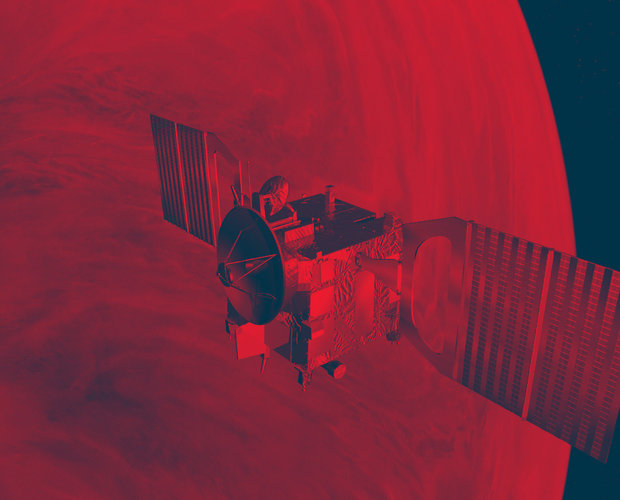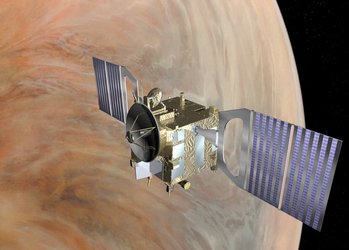Venus Express Flight Control Team
Over more than a year of preparations, a group of individual experts has come together to learn teamwork and develop trust in each other's skills and abilities.
They are the Flight Control Team (FCT), the people who actually fly Venus Express, working on a multi-million-Euro science mission that will travel to Earth's nearest planetary neighbour.
Fourteen experts supported by ESOC specialists
The Venus Express FCT consists of the Spacecraft Operations Manager (SOM), Andrea Accomazzo, and 13 engineers, analysts and spacecraft controllers, all of whom work at ESA's Space Operations Centre (ESOC), in Darmstadt, Germany.
The FCT works directly for the Ground Segment Manager, Manfred Warhaut, and is supported by numerous ESOC specialists in the areas of flight dynamics, software support and ground stations, among others.
Spacecraft Operations Manager

After several years at Fiat Avio, where he helped design the Vega launch vehicle and the Rosetta lander, SOM Andrea Accomazzo joined ESA in 1999.
He then worked at ESOC on Rosetta; Venus Express is his first mission as Spacecraft Operations Manager.
Spacecraft Controller ('spacons')

Working as Spacecraft Controllers, or 'spacons,' Francesca Krueger, Glenn Hurrell and Roland Koehler are some of the more recently joined, junior members who bring a great deal of enthusiasm and intensity to the mission.
Krueger also typifies the complex antecedents of this pan-European team: her father is American and her mother Italian, and she actually grew up in Darmstadt speaking English, German and Italian.
She is also remarkable for having entered the space industry later in her career after earning a degree in computer science in the UK. She previously worked in business in London and Spain.
The three controllers are ably supported by Ulrich Kaiser, who, as a trainee, is not formally part of the team but who will be assigned to future missions at ESOC after gaining experience on Venus Express.
Mission planning engineer

Isabelle Dauvin, from a town near Caen in Normandy, France, is also keen on the Venus Express mission, her first.
She joined ESA as a Young Graduate Trainee (YGT) in 2004 after earning physics degrees in France and Canada, and she works as a mission planning engineer.
Spacecraft analyst

Norbert Schmitt, who, like Krueger, is from the Darmstadt area, is spacecraft analyst for VEX.
He joined the VEX flight team in November 2004 after working on Rosetta and XMM. Schmidt is a radio engineer by training and now works on the mission control system software and associated databases.
Spacecraft engineers
Ignacio Tanco and Peter Schmitz also work as spacecraft engineers for VEX, covering systems and payload operations, respectively.

Tanco overseas mission-wide activities such as operations readiness, testing, procedures and training; after launch, he'll focus on planning, preparations for VOI and evaluation.
Originally from northern Spain, Tanco earned degrees at two American universities before working at Motorola on Iridium and, back in Europe, at Vega and Telespazio; he moved to ESOC in 2001 where he worked on Rosetta.
Deputy Spacecraft Operations Manager

Peter Schmitz serves as deputy SOM and will head up the 'B' team when the FCT is split into two teams to provide 24-hour-per-day manning in ESOC's Main Control Room during the immediate post-launch LEOP phase.
Schmitz is also responsible for overseeing flight-related issues for the Venus Monitoring Camera (VMC), and he is planning the Moon observation campaign, due to occur 14 days after launch. Every FCT engineer has at least one or two payload instruments to look after.
Schmitz started at ESA in 2000 after a stint as a YGT, and VEX will mark his fourth launch campaign after Ulysses, Mars Express and Rosetta.
The VEX FCT is rounded out by five additional spacecraft engineers.















 Germany
Germany
 Austria
Austria
 Belgium
Belgium
 Denmark
Denmark
 Spain
Spain
 Estonia
Estonia
 Finland
Finland
 France
France
 Greece
Greece
 Hungary
Hungary
 Ireland
Ireland
 Italy
Italy
 Luxembourg
Luxembourg
 Norway
Norway
 The Netherlands
The Netherlands
 Poland
Poland
 Portugal
Portugal
 Czechia
Czechia
 Romania
Romania
 United Kingdom
United Kingdom
 Slovenia
Slovenia
 Sweden
Sweden
 Switzerland
Switzerland






























